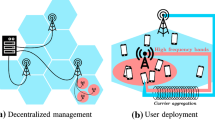Abstract
Microcell/macrocell architectures are generally deployed in current cellular networks, and involve allocating each cell to a preliminary channel set to support the communications of mobile subscribers. However, cellular networks suffer risks of base transceiver station (BTS) service failure and traffic load variation among BTSs. Both of these conditions impact traffic-carrying capacity and mobile subscriber satisfaction. This investigation presents a dynamic channel set allocation algorithm for ensuring continuous optimization of overall traffic-carrying capacity. This algorithm can tolerate BTSs failure and also resolve the traffic-adaptive problem. Additionally, analytical and simulation results are presented to demonstrate the efficiency of the algorithm.
Similar content being viewed by others
References
A. Byungchan, Y. Hyunsoo and C. Jung Wan, “A Design of Macro–Micro CDMA Cellular Overlays in the Existing Big Urban Areas,” IEEE Journal on Selected Areas in Communications, Vol. 19, No. 10, pp. 2094–2104, October 2001.
F.D. Baiocchi, F.G. Priscoli and F. Sestini, “The Geometric Dynamic Channel Allocation as a Practical Strategy in Mobile Networks With Bursty User Mobility,” IEEE Transactions on Vehicular Technology, Vol. 44, pp. 14–23, February 1995.
G. Cao, “Integrating Distributed Channel Allocation and Adaptive Handoff Management for QoS-Sensitive Cellular Networks,” ACM/Kluwer Wireless Networks (WINET), Vol. 9, pp. 131–142, March 2003.
G. Cao and M. Singhal, “Distributed Fault-Tolerant Channel Allocation for Cellular Networks,” IEEE Journal on Selected Areas in Communications, Vol. 18, No. 7, pp. 1326–1337, July 2000.
G. Cao and M. Singhal, “Efficient Distributed Channel Allocation for Cellular Networks,” Computer Communication, Vol. 23, pp. 950–961, 2000.
J.S. Chen and C.R. Dow, “Fixed Channel Allocation Scheme Performance Enhancement for Cellular Systems,” IEE Proceedings on Communications, Vol. 49, No. 4, pp. 232–236, August 2002.
C.R. Dow and J.S. Chen, “A Distributed Fault-Tolerant Resource Planning Scheme for Wireless Networks,” Wireless Personal Communications, Vol. 24, No. 3, pp. 429–445, February 2003.
I. Katzela and M. Naghshineh, “Channel Assignment Schemes for Cellular Mobile Telecommunication Systems: A Comprehensive Survey,” IEEE Personal Communications, Vol. 33, pp. 10–31, June 1996.
L. Lamport, “Time, Clocks, and the Ordering of Events in a Distributed System,” Communication of ACM, Vol. 21, No. 7, pp. 558–565, July 1978.
L. Bo, W. ChengKe and A. Fukuda, “Performance Analysis of Flexible Hierarchical Cellular Systems With a Bandwidth-Efficient Handoff Scheme,” IEEE Transactions on Vehicular Technology, Vol. 50, No. 4, pp. 971–980, July 2001.
Y.B. Lin, W.R. Lai and R.J. Chen, “Performance Analysis for Dual Band PCS Networks,” IEEE Transactions on Computers, Vol. 49, No. 2, February 2000.
J. Mar and J.P. Huang, “Traffic Performance Analysis of Integrated Dual-Band Cellular Radio Networks,” IEE Proceedings on Communications, Vol. 147, No. 3, June 2000.
J. Nie and S. Haykin, “A Q-Learning-Based Dynamic Channel Assignment Technique for Mobile Communication Systems,” IEEE Transactions on Vehicular Technology, Vol. 48, No. 5, pp. 1676–1687, September 1999.
C. Oliveira, J.B. Kim and T. Suda, “An Adaptive Bandwidth Reservation Scheme for High-Speed Multimedia Wireless Networks,” IEEE Journal on Selected Areas in Communications, Vol. 16, No. 6, pp. 858–874, August 1998.
J. Perez-Romero, O. Sallent and R. Agusti, “Traffic and Physical Layer Effects on Packet Scheduling Design in W-CDMA Systems,” Electronics Letters, Vol. 38, No. 7, pp. 341–342, March 2002.
R. Prakash, N.G. Shivaratri and M. Singhal, “Distributed Dynamic Fault-Tolerant Channel Allocation for Cellular Networks,” IEEE Transactions on Vehicular Technology, Vol. 48, No. 6, pp. 1874–1888, November 1999.
G. Richart and A.K. Agrawal, “An Optimal Algorithm for Mutual Exclusion in Computer Networks,” Communications of the ACM, pp. 9–17, January 1981.
R.D. Schlichting and F.B. Schneider, “Fail-Stop Processors: An Approach to Designing Fault-Tolerant Computing Systems,” ACM Transactions on Computing Systems, Vol. 1, No. 3, pp. 222–238, August 1983.
M. Singhal, “A Dynamic Information-Structure Mutual Exclusion Algorithm for Distributed Systems,” IEEE Transactions on Parallel and Distributed Systems, Vol. 3, pp. 121–125, January 1992.
S.C. Wan and K.W. Shum, “Channel Assignment and Layer Selection in Hierarchical Cellular System with Fuzzy Control,” IEEE Transactions on Vehicular Technology, Vol. 50, No. 3, pp. 657–663, May 2001.
K.L. Yeung and S.S. Nanda,“Channel Management in Microcell/Macrocell Cellular Radio Systems,” IEEE Transactions on Vehicular Technology, Vol. 45, No. 4, pp. 601–612, November 1996.
T.-S.P. Yum and K.L. Yeung, “A New Quality of Service Measure for Cellular Radio Systems,” IEEE Transactions on Vehicular Technology, Vol. 46, No. 3, pp. 610–614, August 1997.
M. Zhang, and T.-S.P. Yum, “The Nonuniform Compact Pattern Allocation Algorithm for Cellular Mobile Systems,” IEEE Transactions on Vehicular Technology, Vol. 40, No. 2, pp. 387–391, May 1991.
Author information
Authors and Affiliations
Corresponding author
Additional information
Chyi-Ren Dow was born in 1962. He received the B.S. and M.S. degrees in information engineering from National Chiao Tung University, Taiwan, in 1984 and 1988, respectively, and the M.S. and Ph.D. degrees in computer science from the University of Pittsburgh, U.S.A., in 1992 and 1994, respectively. Currently, he is a Professor in the Department of Information Engineering, Feng Chia University, Taiwan. His research interests include mobile ad-hoc networks, network agents, learning technologies, and embedded systems.
Jong-Shin Chen was born in 1972. He received the B.Sc. and Ph.D. degrees in engineering from Feng Chia University, Taiwan, in 1996 and 2003, respectively. His research interests include mobile computing, wireless communications, capacity planning, and systems.
Yi-Hsung Li was born in 1979. He received his B.S. degree and M.S. degree in information engineering from Feng Chia University, Taiwan, in 2001 and 2003. He is currently a graduate student for the Ph.D. degree in the Department of Information Engineering and Computer, Feng Chia University, Taiwan. His research interests include personal communications, mobile computing, learning technologies, and network agents.
Rights and permissions
About this article
Cite this article
Dow, CR., Chen, JS. & Li, YH. An Adaptive and Fault-Tolerant Channel Set Allocation Algorithm for Microcell/Macrocell Cellular Networks. Wireless Pers Commun 33, 197–212 (2005). https://doi.org/10.1007/s11277-005-4112-y
Issue Date:
DOI: https://doi.org/10.1007/s11277-005-4112-y




